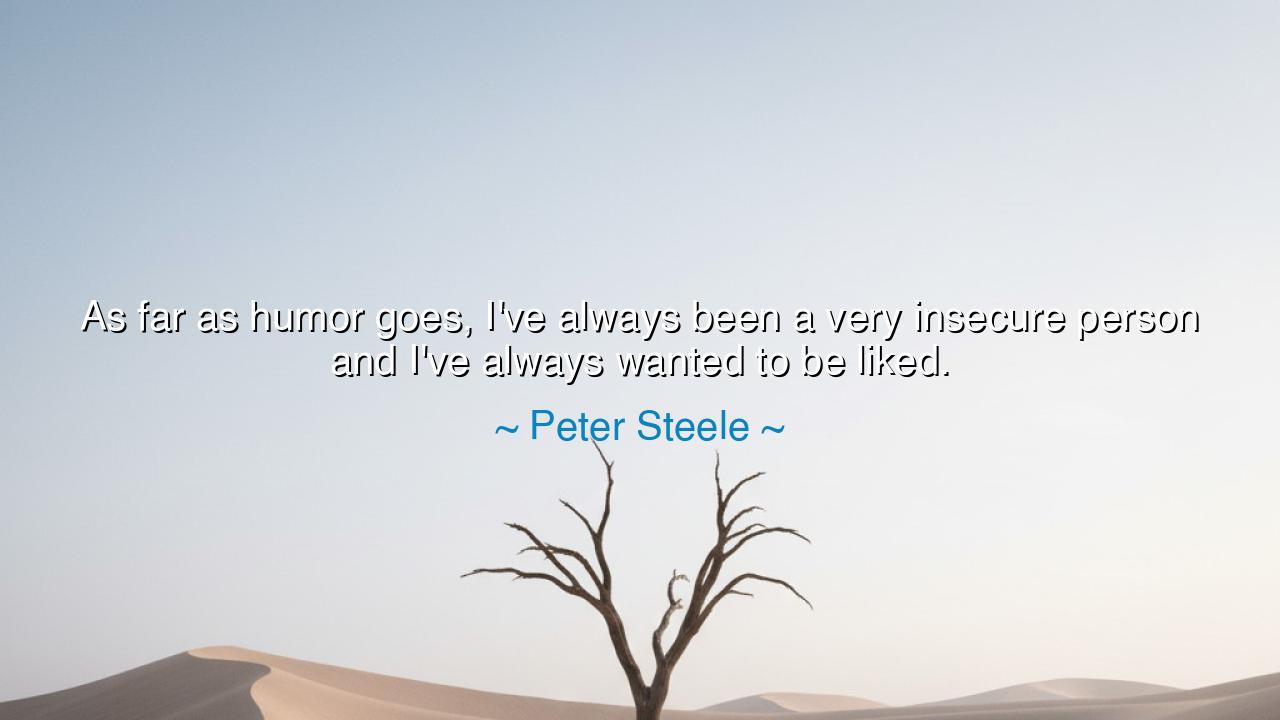
As far as humor goes, I've always been a very insecure person and
As far as humor goes, I've always been a very insecure person and I've always wanted to be liked.






When Peter Steele said, “As far as humor goes, I've always been a very insecure person and I've always wanted to be liked,” he revealed a truth as timeless as humanity itself: that humor is often born not merely from wit or joy, but from vulnerability and the deep desire for connection. Steele, a towering figure in music with a voice and presence that commanded attention, confessed the hidden pulse behind his laughter — the quiet fear of rejection, the yearning to be accepted. In his words, we glimpse the paradox of humor: it can be both a shield and a bridge, protecting the soul while reaching out for understanding.
The ancients would have recognized this intimately. Plato spoke of the masks we wear, the personas we adopt to navigate society. Humor, in this sense, is a mask and a mirror: it hides insecurity while revealing insight, it allows the soul to engage with others safely, and yet in its very expression, it betrays longing. Steele’s confession mirrors this duality: laughter is not only a form of entertainment but a statement of vulnerability, a recognition that human approval matters, and that connection is a sacred desire.
Even in history, the greatest humorists often reveal their own fragility through their wit. Consider Mark Twain, who beneath his clever quips and biting satire, wrestled with self-doubt and personal sorrow. His humor, like Steele’s, was both armor and invitation — a way to engage others while negotiating the insecurities of the heart. To laugh at life is to assert presence; to seek laughter from others is to seek affirmation, a reminder that one belongs in the intricate web of humanity.
Steele’s reflection also speaks to the transformative power of humor. In the face of insecurity, humor allows one to reclaim agency. The very act of making others smile becomes a tool for connection and validation. The ancients understood this principle in their theater and storytelling: jesters, poets, and philosophers alike wielded humor to navigate social hierarchies, to critique the powerful, and to engage audiences — all while maintaining their own dignity and humanity. Steele’s confession is a modern echo of this timeless truth: laughter is a language of both defense and desire.
Yet humor born from insecurity carries a profound honesty. It requires the courage to expose one’s imperfections, to confront the fear of rejection, and to risk vulnerability for the sake of communion. Steele’s words remind us that the most enduring laughter is not forced or arrogant; it is deeply human. It connects, resonates, and reassures both speaker and listener that imperfection is universal. Humor becomes a bridge across isolation, a signal that we are seen, recognized, and shared.
A historical illustration can be found in Charlie Chaplin, whose on-screen antics brought joy to millions. Behind the iconic mustache and comedic falls, Chaplin endured personal and professional struggles, yet he transformed them into laughter for others. His humor, much like Steele’s, carried the undertones of insecurity and longing, making it profoundly relatable. Through laughter, Chaplin and Steele alike sought connection, reminding us that even the strongest and most commanding figures harbor vulnerabilities that shape their art and their relationships.
The lesson, then, is clear: embrace humor not only as amusement but as a tool for honesty and connection. Recognize that seeking approval through laughter is not weakness, but a natural expression of our social and emotional needs. By acknowledging our insecurities, we can use humor to bridge gaps, heal wounds, and foster empathy. Steele’s words remind us that humor is at its most powerful when it springs from the authentic heart, not merely from cleverness or artifice.
In practical terms, this means observing our own motivations when we laugh or make others laugh. Let humor reflect truth rather than pretense, and use it to connect rather than alienate. Be mindful that even in jest, we can reveal vulnerability and foster understanding. As Peter Steele teaches, laughter is a declaration: that though we fear rejection, though we are imperfect, we are alive, and in sharing our humor, we reach for acceptance, compassion, and the profound joy of human connection.






AAdministratorAdministrator
Welcome, honored guests. Please leave a comment, we will respond soon